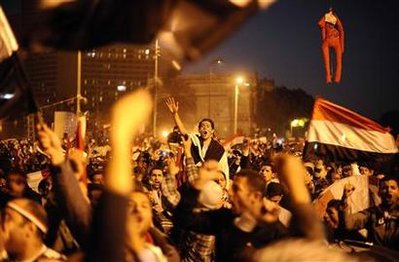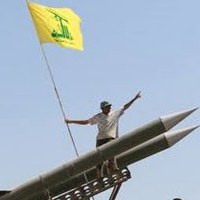![]()
Fri, Feb 11, 2011 | The Rubin Report | By Barry Rubin

Anti-government protesters celebrate inside Tahrir Square after the announcement of Egyptian President Hosni Mubarak's resignation in Cairo, February 11, 2011. (REUTERS/Dylan Martinez)
Egypt: The Mubarak Resignation and Its Consequences
In a move that simultaneously caught the world by surprise and yet indicated the regime’s strategy, Egyptian President Husni Mubarak announced his resignation only hours after refusing to resign.
The most likely possibility in this truly bizarre series of events is that General Tantawi and the army high command did not fully agree with Vice-President Suleiman’s plan to tough it out and try to p reserve the regime. The army thus removed the regime. The revolutionaries had been very careful to express their respect for the military. The generals then figured it was easier to make them the winning side rather than engage in confrontation.
Actually, though, none of this matters for the future. And to paraphrase Egypt’s greatesst novelist, Naguib Mahfouz, there are a lot more memories coming!
So Mubarak is gone. The first point is that while this is huge in psychological terms, it is less important in strategic terms. Either health or the end of his term in September would have taken the 82-year-old president out of office soon any way. The real news is the army’s statement that the entire regime will disband.
The immediate effect is to set off celebrations throughout Egypt. On one hand, this benefits the regime, which has now removed its most hated symbol. On the other hand, since the revolutionary movement can take credit for Mubarak’s fall it is going to be seen as gathering momentum.
So now what will happen? The military’s first communique gave several ideas:
— “First: End the state of emergency as soon as the current circumstances are over.” In other words, once the turmoil ends there will be a great more freedom. This clevery gives an incentive for people to stop demonstrating and go back to work.
— “Decide on the appeals against elections and consequent measures.” The last elections were unfair and the military will decide whether they were stolen. If so, new parliamentary elections could be offered.
— “Conduct needed legislative amendments and conduct free and fair presidential elections in light of the approved constitutional amendments.” This implies that the constitution will be amended before elections. One change would probably be that the Muslim Brotherhood becomes legal.
— “Second: The Armed forces are committed to sponsor the legitimate demands of the people and achieving them by following on the implementation of these procedures in the defined time frames with all accuracy and seriousness and until the peaceful transfer of authority is completed towards a free democratic community that the people aspire to.”
This implies the end of the 60-year-old regime and a total victory for the revolution. Of course, the army might have some tricks up its sleeve.
— “Third: The Armed Forces emphasize on no security pursuit of the honest people who refused the corruption and demanded reforms, and warns against touching the security and safety of the nation and the people. And emphasizes the need for regular work in state facilities and regaining of life to normal to preserve the interests and possessions of our great people.”
In other words, no one will be prosecuted for their actions during the revolution.
Here are the issues to watch:
— Will the army dissolving the parliament and hold new parliamentary elections?
— How will the regime amend the constitution?
— According to the existing constitution there must be an election within sixty days. Is this going to happen?
— Will the demonstrations die down now that Mubarak is gone or will the pressure be kept up?
— Who will run for president? The Muslim Brotherhood will not run by itself but will support Muhammad ElBardei. What opposition will there be to him, if any? Given the short time available, would anyone be able to organize a party except for the ElBardei-Brotherhood coalition?
If that last point is true, then we have to go back to all of our previous discussion regarding Egypt’s future. For, after all, if ElBardei is going to be president, the army doesn’t object, and his main ally is the Muslim Brotherhood, the next government is likely to be a coalition that gives it an important (but not necessarily prominent) role.
There will be much cheering but one should remember the following facts:
— El Bardei is totally untested and has no prior political or governing experience.
— His views are relatively radical as will be his colleagues on foreign policy. There is an interesting question about how grateful he would be to Obama, to whom perhaps he feels he partly would owe his position. That might be a mitigating factor.
— Note that Obama said that the United States would do everything possible to help a democratic Egypt. Is he going to propose an international aid consortium or raise current levels of U.S. aid? Given the economic situation that is hard to believe.
— It will be interesting to watch the reactions of Iran and of Arab governments to the new regime, if there’s going to be one. Will Iran and Syria be enthusiastic–which would be the smarter move–or reserved, viewing ElBardei as an American puppet. The Saudis and Jordanians will be nervous, wondering whether ElBardei would support regime change in their countries. The Jordanians have the additional concern since their main opponent at home is the Jordanian Muslim Brotherhood, ally of one of ElBaradei’s main supporters.
— What would the new regime do on the Egypt-Gaza Strip border? One might speculate that they would open the border — a tremendously popular move in Egypt — and insist to the United States that the Egyptian army will keep out weapons. I don’t believe this. Hamas, too, will be celebrating. In a sense, Hamas would have the ability to create a major regional crisis by attacking Israel since it can presume a degree of Egyptian support.
— As for Israel it would seek normal relations with the new government. How would ElBaradei treat the peace treaty? Under tremendous American pressure, he would see no need to tear it up formally. For a time at least the Brotherhood would agree to just let it be a dead letter. How would the current gas sales be treated? Perhaps they would just continue or, perhaps, the line would just be conveniently sabotaged enough so that no more gas would be sold.
This is really interesting: Presidential elections are apparently going to happen before parliamentary elections. This puts the emphasis for anyone who wants to play a big role in Egypt’s future to come up with a candidate. Will there be an “old regime” or radical nationalist competitor to ElBaradei and his reform-Islamist coalition?
Remember, the principal threat is not a Muslim Brotherhood takeover and an Islamist state but a radical Egypt in international terms. And the next presidential election in Egypt is not the end of history. The problem is not just to create a democratic Egypt but to sustain it.
Remember also that many now say the Bush Administration’s overthrow of Saddam Hussein created a vacuum that boosted Iran’s growing power. To what will Mubarak’s overthrow open the door?
Finally, on a historical note, while the revolution in Egypt will be attributed completely to the opposition’s strategy, the foundation for it was Mubarak’s mistake in refusing to step down and insistance on having his unqualified son as his successor. Those two mistakes of hubris led to his downfall.
About the author,
Barry Rubin is director of the Global Research in International Affairs (GLORIA) Center and editor of the Middle East Review of International Affairs (MERIA) Journal. His latest books are The Israel-Arab Reader (seventh edition), The Long War for Freedom: The Arab Struggle for Democracy in the Middle East (Wiley), and The Truth About Syria (Palgrave-Macmillan). The GLORIA Center’s site is http://www.gloria-center.org and of his blog, Rubin Reports, http://www.rubinreports.blogspot.com.



 RSS
RSS










#Egypt: the #Mubarak Resignation and Its Consequences | #Islamism #Israel #US #Hamas #Gaza #MuslimBrotherhood #Jan25 http://j.mp/fSxwV8